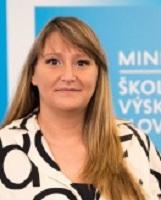2022
 „Digital skills and digital literacy are a must in the 21st century. We want students and teachers to be digitally literate, able to work with technology and the Internet, and be prepared for the pitfalls of the Internet in the form of hoaxes or misinformation. We therefore support the development of digital literacy as part of the reform of educational content. The IT fitness test is a way for us to monitor and evaluate digital literacy for students and teachers. Pupils and teachers will test their digital skills and compare them with the V4 countries and they will then be entered into a prize draw. In this way, I want to encourage schools to take advantage of the IT fitness test and get involved.“
„Digital skills and digital literacy are a must in the 21st century. We want students and teachers to be digitally literate, able to work with technology and the Internet, and be prepared for the pitfalls of the Internet in the form of hoaxes or misinformation. We therefore support the development of digital literacy as part of the reform of educational content. The IT fitness test is a way for us to monitor and evaluate digital literacy for students and teachers. Pupils and teachers will test their digital skills and compare them with the V4 countries and they will then be entered into a prize draw. In this way, I want to encourage schools to take advantage of the IT fitness test and get involved.“
Minister of Education, Science, Research and Sports of the Slovak Republic Branislav Gröhling
<div class="clearfix"></div> „If the European Union is to become a true leader in innovation, manage the digital transformation and preserve democracy, its people will not be able to do it without quality digital skills. And the IT Fitness Test can canbecome a barometer of these abilities. Almost two thirds of Slovaks (64%) are convinced that they can easily identify false information. The IT Fitness Test will help you verify that this is indeed the case. This year, the IT fitness test is becoming truly European. In addition to Slovak woman and man, our neighbors from the V4 countries and English-speaking Internet users will also be able to participate.“
„If the European Union is to become a true leader in innovation, manage the digital transformation and preserve democracy, its people will not be able to do it without quality digital skills. And the IT Fitness Test can canbecome a barometer of these abilities. Almost two thirds of Slovaks (64%) are convinced that they can easily identify false information. The IT Fitness Test will help you verify that this is indeed the case. This year, the IT fitness test is becoming truly European. In addition to Slovak woman and man, our neighbors from the V4 countries and English-speaking Internet users will also be able to participate.“
Head of the Representation of the European Commission in Slovakia Vladimír Šucha
<div class="clearfix"></div> „After ten successful years of testing digital skills of pupils, students, teachers and interested members of the public in Slovakia, we managed a real hussar piece, when our entire system of monitoring, testing and evaluation of digital skills was taken over by all V4 countries and the project became under Slovak baton. international. I believe that our foreign partners will not regret this decision, but on the contrary, they will add tens of thousands more test graduates. We will be able to compare how we are in the V4 countries, but most importantly everyone tested will get a good overview of their digital skills and will know where they need to improve.“
„After ten successful years of testing digital skills of pupils, students, teachers and interested members of the public in Slovakia, we managed a real hussar piece, when our entire system of monitoring, testing and evaluation of digital skills was taken over by all V4 countries and the project became under Slovak baton. international. I believe that our foreign partners will not regret this decision, but on the contrary, they will add tens of thousands more test graduates. We will be able to compare how we are in the V4 countries, but most importantly everyone tested will get a good overview of their digital skills and will know where they need to improve.“
First Vice President of the IT Association of Slovakia and Chairman of the Board of the Digital Coalition - Slovak National Coalition for Digital Skills and Jobs Mário Lelovský
<div class="clearfix"></div> „Spread the discussion in the classroom, try various practical tasks with the Internet, explore the functioning of IT service settings (eg Instagram) - you will experience all this with the IT fitness test, which returns to the Czech Republic after years. I recommend that students try the test and use it for reflection and debate about what digital skills we all need to develop. If the test provokes you to come up with your own tasks, just fine. We are interested in how you look at the world of IT skills. Join the LINKEDIN group DigiKompetence and discuss with us.“
„Spread the discussion in the classroom, try various practical tasks with the Internet, explore the functioning of IT service settings (eg Instagram) - you will experience all this with the IT fitness test, which returns to the Czech Republic after years. I recommend that students try the test and use it for reflection and debate about what digital skills we all need to develop. If the test provokes you to come up with your own tasks, just fine. We are interested in how you look at the world of IT skills. Join the LINKEDIN group DigiKompetence and discuss with us.“
Edusíť & DigiKoalice Czech Republic Mgr. Petr Naske
<div class="clearfix"></div>2021
 “I consider the development of digital skills to be an integral part of a modern education. The pandemic has clearly shown their importance and significance over the past year. Pupils, students, and even many of us adults have had to improve our digital skills. In order for the digital transformation that awaits our society to be fair, all segments of the population, regardless of age, social status or place of residence, must have access to it.”
“I consider the development of digital skills to be an integral part of a modern education. The pandemic has clearly shown their importance and significance over the past year. Pupils, students, and even many of us adults have had to improve our digital skills. In order for the digital transformation that awaits our society to be fair, all segments of the population, regardless of age, social status or place of residence, must have access to it.”
Deputy Prime Minister and Minister of Investment, Regional Development, and Informatization of the Slovak Republic Veronika Remišová
<div class="clearfix"></div> “Promoting digital skills is very important for our sector and the fact that digital technologies have become an integral part of our private and professional lives has become fully apparent during the pandemic. However, it is not enough to rely solely on the availability of digital technology in schools. If teachers and students lack digital skills, they will not be able to take full advantage of modern technologies. That is why I appreciate that this year’s IT Fitness Test has shown us the real picture of how we are doing with digital skills and where to we need to improve. As one of the goals of the Ministry of Education is supporting inclusive education, I would also like to point out that for the first time in history, the test’s authors managed to successfully create a test in Hungarian for schools where Hungarian is the language of instruction.”
“Promoting digital skills is very important for our sector and the fact that digital technologies have become an integral part of our private and professional lives has become fully apparent during the pandemic. However, it is not enough to rely solely on the availability of digital technology in schools. If teachers and students lack digital skills, they will not be able to take full advantage of modern technologies. That is why I appreciate that this year’s IT Fitness Test has shown us the real picture of how we are doing with digital skills and where to we need to improve. As one of the goals of the Ministry of Education is supporting inclusive education, I would also like to point out that for the first time in history, the test’s authors managed to successfully create a test in Hungarian for schools where Hungarian is the language of instruction.”
State Secretary at the Ministry of Education, Science, Research, and Sport of the Slovak Republic Svetlana Síthová
<div class="clearfix"></div> “Digital skills have been able to make our work, shopping, or family contact easier in the new conditions which were caused in particular by the COVID-19 pandemic. The IT Fitness Test is a great tool for all Slovak citizens to not only measure their digital skills, but also compare them with the European average. I am glad that a record number of participants have taken part in the current year. Additional European funding will soon contribute to improving digital skills, with up to 21% of the total €6 billion recovery plan earmarked for further digitization, including improving education in this area.”
“Digital skills have been able to make our work, shopping, or family contact easier in the new conditions which were caused in particular by the COVID-19 pandemic. The IT Fitness Test is a great tool for all Slovak citizens to not only measure their digital skills, but also compare them with the European average. I am glad that a record number of participants have taken part in the current year. Additional European funding will soon contribute to improving digital skills, with up to 21% of the total €6 billion recovery plan earmarked for further digitization, including improving education in this area.”
Head of the Representation of the European Commission Ladislav Miko
<div class="clearfix"></div> “With more than twice as many respondents, results have shown that knowledge of digital skills is different in schools and the involvement of new schools in testing has led to a significant reduction in overall average success. A large number of students, teachers, and schools have tested their digital skills in the IT Fitness Test for the first time. On the one hand, we are pleased with the huge number of respondents, but the decline in overall success should be a warning to us that our students have something to catch up on in terms of IT skills. For employers, mastery of digital office tools is a must-have and graduates cannot expect ignorance to be tolerated in the workplace. In conclusion, I would like to thank all the partners, sponsors, guarantors, authors, and translators of the test who helped us with the implementation of the 10th Annual IT Fitness Test. Without them, we would not have achieved this success.”
“With more than twice as many respondents, results have shown that knowledge of digital skills is different in schools and the involvement of new schools in testing has led to a significant reduction in overall average success. A large number of students, teachers, and schools have tested their digital skills in the IT Fitness Test for the first time. On the one hand, we are pleased with the huge number of respondents, but the decline in overall success should be a warning to us that our students have something to catch up on in terms of IT skills. For employers, mastery of digital office tools is a must-have and graduates cannot expect ignorance to be tolerated in the workplace. In conclusion, I would like to thank all the partners, sponsors, guarantors, authors, and translators of the test who helped us with the implementation of the 10th Annual IT Fitness Test. Without them, we would not have achieved this success.”
Chairman of the Board of the Digital Coalition and First Vice President of the IT Association of Slovakia Mário Lelovský
<div class="clearfix"></div> “The group of almost 50,000 who took the IT fitness test clearly shows us the interest in the issue of knowing people’s IT skills which exists. For us, this is the moment when, based on the data and its analysis, we prepare specific programs for Slovakia aimed at improving skills and acquiring new ones. Our goal is to put in place solutions that will help overcome skills shortages and prepare people for work and quality of life now and in the future - from basic education to developing skills in employment and lifelong learning. We are aware that Slovakia urgently needs to put concrete improvements into practice to reduce the skills gap of its inhabitants, and this is where we will direct our activities in the near future. In addition to a package of comprehensive courses and training programs, we will present a new initiative - Ten steps for reducing the skills gap in the private and public sectors.”
“The group of almost 50,000 who took the IT fitness test clearly shows us the interest in the issue of knowing people’s IT skills which exists. For us, this is the moment when, based on the data and its analysis, we prepare specific programs for Slovakia aimed at improving skills and acquiring new ones. Our goal is to put in place solutions that will help overcome skills shortages and prepare people for work and quality of life now and in the future - from basic education to developing skills in employment and lifelong learning. We are aware that Slovakia urgently needs to put concrete improvements into practice to reduce the skills gap of its inhabitants, and this is where we will direct our activities in the near future. In addition to a package of comprehensive courses and training programs, we will present a new initiative - Ten steps for reducing the skills gap in the private and public sectors.”
Microsoft Czech Republic and Slovakia’s Director for Education Marcela Havrilová





